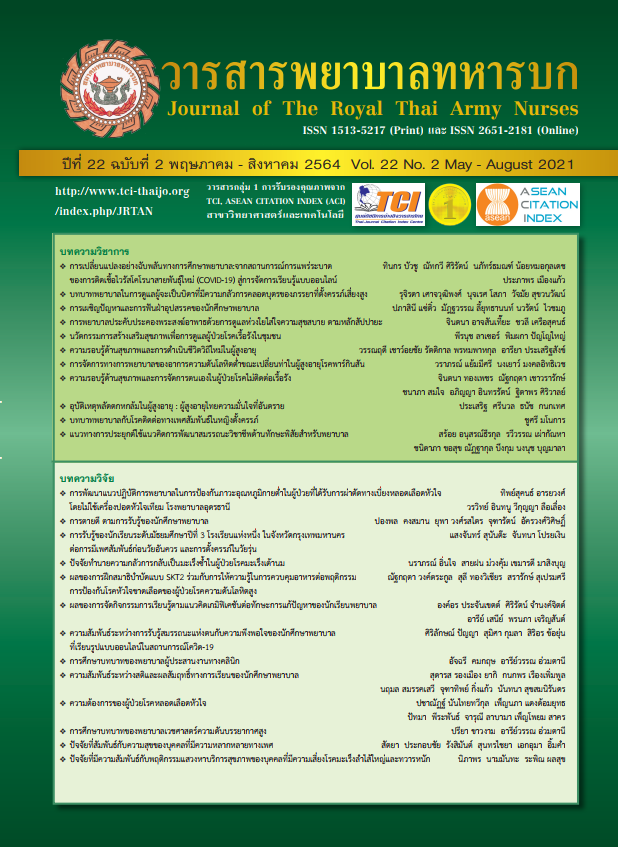The Development of The Moral Identity Indicator for Nursing Students
Keywords:
moral identity, indicators, nursing studentsAbstract
The purposes of this mixed-method research were to study and develop the components of moral identity indicators (MII) for student nurses at Phrachomklao Phetchaburi College of Nursing (PCKCN). A qualitative study at the initial stage of the study was conducted by reviewing literatures regarding Thai’s core values, Thai Qualification Framework for Higher Education, Nursing Ethics, Identities of PCKCN’s Graduates, and moral identity of PCKCN. In-depth interviews 20 persons among administers, constructors, students, and graduate users also yielded key Informants for the construction of the MII questionnaire. The developed MII questionnaire was composed of three levels of MII: individual level, college level and professional level, validated by three ethics experts (IOC = .67-1.00) and obtained good internal reliability of the questionnaire (Cronbach’s Alpha Coefficient: α = .976). Language improvement was performed. The questionnaire was then applied to test among 364 student nurses of PCKCN. Moral identity indicators were analyzed by Factor Loading and Confirmatory Factor Analysis (CFA). Results revealed that MII for student nurses at PCKCN comprised of 52 indicators showed consistency of the developed model and evidenced data (Kaiser-Meyer-Olkin Measure = .954 Chi square = 5709.06, df = 231 p = .000)
Downloads
References
Thailand Nursing and Midwifery Councill. Ethics Promotion Guide for Nursing Organizations: Mechanisms and Practices 1, editor. Nontaburi: Golden Point Co., Ltd.; 2015. (in Thai)
World Health Organization. Nurse educator core competencies. Geneva: The WHO Document Production Services. 2016.
Division of Strategy PI. Strategic Plan of Praboromarajchanok Institute (2020-2024). Nonthaburi, Thailand: The Ministry of Public Health; 2019. (in Thai)
Praboromarajchanok Institute. Learning outcomes evaluating and assessing tools according to Thai Qualification Framework for Higher Education in Bachelor Degree in Nursing Curriculum (Update Curriculum 2017). Nonthaburi, Thailand: Praboromarajchanok Institute, The Ministry of Public Health; 2018. (in Thai)
Siritarungsri B. Graduate Nurses Identity from Distance Learning Curriculum. International Journal of Teaching, Education and Learning. 2018;2(2):20-34.
Center of Virtuous School, Foundation of Virtuous Youth. Handbook of arrangement of activities to develop virtuous schools. 3ed. The Crown Property Bureau: Sahamitr Printing and Publishing, Ltd. ; 2017.
Department of Strategy and Quality Development PCKCN. Annual Report of Achieved Outcomes Consistence with Strategic and Action Plan in the Fiscal Year 2018. Phetchaburi: Phrachomklao Phetchaburi College of Nursing; 2018. (in Thai)
Phantuwat P. Saengfuang V. Development and utilization of research tools in activities enhancing ethics, follow-up, and life skills for students in a long-term. Journal of Thai Ombudsman 2020;13(2):81-119 (in Thai)
The Ministry of Education. Educational Development Plan of the Ministry of Education No. 12 (2017-2021). Ministry of Education, Thailand Bureau of Policy and Strategy, Office of the Permanent Secretary; 2017. (in Thai)
Tangchitcharoenkhul R, Kijtorntham W, Anusasananan S. Pikun Ekwarangkoon P., Tangjitjaroenkun J. Guideline for Desired Morality and Ethics Cultivation of Thai Higher Education Students. Journal of Behavioral Science. 2017;23(1):148-68. (in Thai)
Phrapromkunaporn (P.O.Payutto). Puthatham Extended Issue. Bangkok: University of Southeast Asia; 2019. (in Thai)
Sarakshetrin A, Songwatthanayuth P, Panawatthanapisit S. Learning Strategy in Nursing Education toward The Development of The Twenty-First Century Learning Skills. Journal of The Royal Thai Army Nurses. 2019;20(3): 18-26. (in Thai)
Thailand Nursing and Midwifery Councill. Ethics Promotion Guide for Nursing Organizations : Mechanisms and Practices 1, editor. Nontaburi: Golden Point Co., Ltd.; 2015. (in Thai)
Yamsuda T. Academic corruption : Problems that undermine the strength of society Journal of Naval Medicine 2017. (3),175-181. (in Thai)
Downloads
Published
How to Cite
Issue
Section
License
บทความหรือข้อคิดเห็นใดใดที่ปรากฏในวารสารพยาบาลทหารบกเป็นวรรณกรรมของผู้เขียน ซึ่งบรรณาธิการหรือสมาคมพยาบาลทหารบก ไม่จำเป็นต้องเห็นด้วย
บทความที่ได้รับการตีพิมพ์เป็นลิขสิทธิ์ของวารสารพยาบาลทหารบก
The ideas and opinions expressed in the Journal of The Royal Thai Army Nurses are those of the authors and not necessarily those
of the editor or Royal Thai Army Nurses Association.






